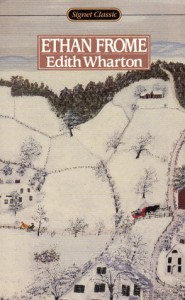Ethan Frome by Edith Wharton

Despite the author’s literary skill, I didn't think much of this novella. In its brief page count, it chronicles the tragedy of Ethan Frome, a struggling young farmer hastily married to a cousin who constantly insists upon her unspecified ailments; while yearning for a better life, Ethan falls hard for his wife’s penniless young cousin, Mattie, who has joined them as a sort of servant.
There is merit here: the clear but artful language and descriptions of the New England countryside (where it is apparently always winter); the nuanced portrayals of everyday events and the characters’ emotional states; a story that moves relatively quickly and builds emotion as it goes. I suspect it’s a rare reader who doesn’t have an emotional reaction to the book, which is short enough and compelling enough to read in a single sitting.
But for many readers – myself included – the predominant emotional reaction is likely to be frustration. This is the second Wharton I’ve read, and both books follow characters who refuse to take available options to solve their problems, and finally conclude (or appear to conclude) that death is the only answer. These books are apparently meant to demonstrate how society limits the individual’s choices. But, to put it rather crudely, I think what this book really demonstrates is how being a pussy limits Ethan’s choices. Why doesn’t he stand up to his wife? Why doesn’t he abandon the farm to his creditors, go to the nearest city and get a job? Why does he feel he could only leave if he could afford to get to California, at a time when new immigrants were arriving and surviving on the East Coast every day? It’s hard for me to feel for a character whose real problem seems to be that he doesn’t have the spine to stand up for himself and the woman he claims to love. Mattie’s problems are somewhat more legitimate, but the story is told so much from Ethan’s perspective that we don’t quite know her; I was left wondering whether she in fact loved Ethan, or just saw him as her only protector; even she might not know the difference.
The other thing that rubs me the wrong way is Wharton’s introduction, in which she explains that the story is short because her poor rural characters are “simple” people with simple emotions: “but half-emerged from the soil, and scarcely more articulate.” This is so condescending and lacking in empathy that I wonder how qualified she really is to write about these characters. Just because someone is poor, half-educated and hasn’t been raised to consider their emotions worthy of analysis and discussion, doesn’t mean they don’t have complicated emotions, or that their life isn’t a long and complicated saga. This book is short because all of the set-up happens before it starts, leaving us to follow the characters only for some quick rising action up to the climax, and then we skip a couple of decades and get all the denouement in a quick retrospective. From a literary standpoint this works well. But the shortness and simplicity comes not from the fact that the characters are incapable of experiencing more, but because Wharton is incapable of imagining them doing so.
I don’t regret reading this: it’s short, well-known and an interesting story. But I definitely wouldn't recommend assigning it to teenagers; even as an adult, it’s a little hard to sympathize with these characters. And let’s keep in mind that while Wharton – without the benefit of today’s social science – fell for the common human fallacy of believing that members of out-groups have emotions less meaningful and complex than our own, we shouldn’t do the same.





